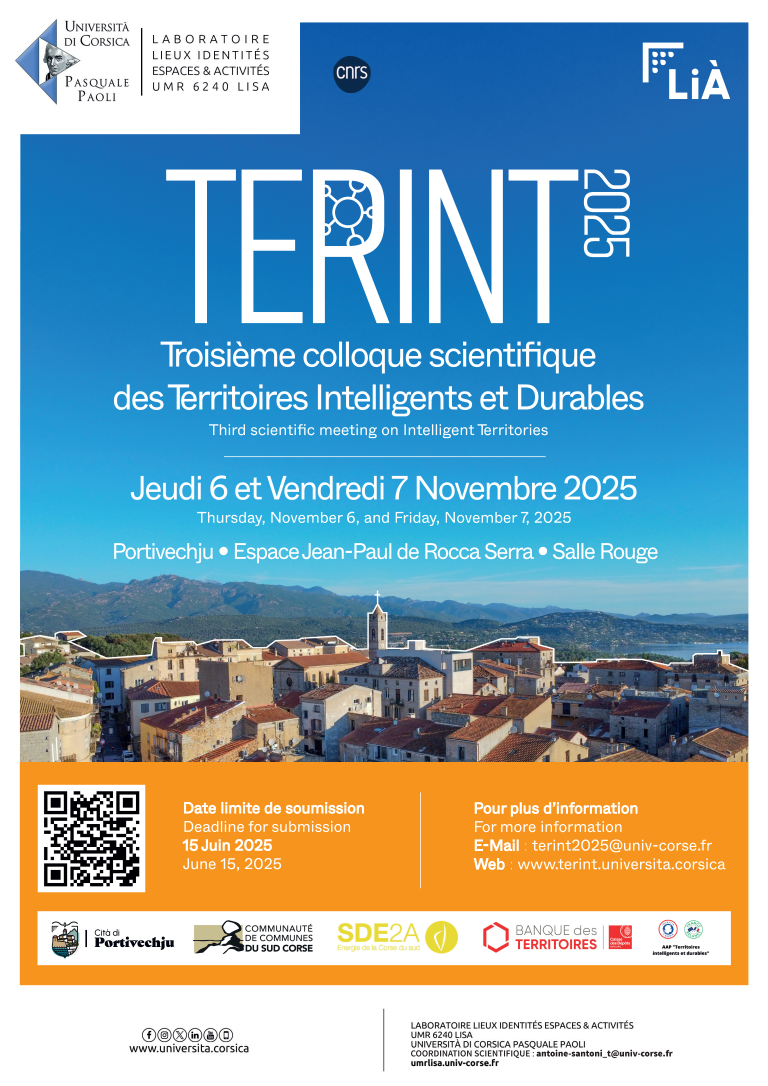|
Emerging Paradigms for Intelligent and Resilient Territories in an Insular Context The contemporary transformation of territories, catalysed by the development of digital technologies, the contribution of advances in computer science and the obvious intensification of climatic upheavals, raises fundamental epistemological questions about the evolution of our anthropogenic spaces. The emerging concept of 'intelligent and resilient territories' is part of a multidisciplinary scientific approach, combining geographical, anthropological, cultural and technological approaches. The aim of this scientific event is to bring together researchers from a wide range of disciplines around this theme.
Island territories have unique characteristics where environmental, economic and societal issues converge. Their intrinsic insularity, their ecosystemic vulnerability, and their socio-cultural and historical particularities make them ideal laboratories for the study of territorial innovation, solidarity mechanisms and collective intelligence applied to territories. In a context where digital technologies are opening up new perspectives for the development of island resources, the major epistemological challenge lies in analysing the ways in which technological innovation and digital transformation can catalyse the emergence of societal value, while contributing to the understanding and development of island specificities. Topics The expected contributions will explore the integration of the concepts of intelligence and resilience in the governance of island territories, using a transdisciplinary approach combining human and social sciences, digital technologies, geography and urban planning. The central issues include :
The aim of this scientific event is to transcend sectoral approaches in order to offer a holistic and integrated analysis of the issues surrounding intelligent and resilient island territories. Purpose and Benefits The aim of this symposium is to illustrate the conference theme through real-life examples, and to formulate concrete recommendations for the transformation of island territories, by combining an academic angle with feedback from field experience. By investigating the interface between technological innovation, cultural practices and public policies, the aim is to reflect on the form of governance capable of reconciling modernity and tradition, efficiency and equity.
The expected results will provide a better understanding of how territories can adapt to contemporary crises, while strengthening their autonomy and identity in the face of global dynamics. Submission guidelines Researchers are invited to submit proposals for articles of 6 to 8 pages (maximum) in French or English (according to the template provided) on the conference theme. Proposals should clearly present the problem addressed, the methodology adopted and the preliminary or expected results. Proposals are to be sent through the sciencesconf.org website (see the documentation for further instructions) Propositions should be written according to the style imposed in the style sheets provided for the colloquium: Example of the desired format : Selected papers will be presented at the conference, which will take place on the X in Cità di Portivechju (France, Corsica), and will be published in the conference proceedings with the Cépaduès editions. We strongly encourage contributions based on concrete case studies, feedback, as well as experimental projects illustrating innovative initiatives in intelligent and resilient territories. Calendar Deadline for submission of manuscripts: Notification of acceptance: Conference date: delayed to 2026 Contact: terint2025@univ-corse.fr
If you have any questions about this call for papers, please contact the organisation at the following address: terint2025@univ-corse.fr You can also track the latest news about this conference, information on previous editions, as well as hotel and We hope that this conference will provide an opportunity to reflect together on the issues surrounding intelligent and resilient territories, and to encourage enriching exchanges between researchers and practitioners from a variety of disciplinary backgrounds. Steering committee Thierry Antoine-Santoni, Full Professor, Università di Corsica, UMR CNRS LISA 6240 Amandine Terrazzoni, Lià Project Manager, Cità di Portivechju. Theo Nguyen Van Hoan, PhD student in Computer Science, LIà Program, UMR CNRS LISA 6240 Lisa Pupponi, PhD student in Geography, LIà Program, UMR CNRS LISA 6240 Donat Fortini, IT work-study student, LIà Program, UMR CNRS LISA 6240 Scientific committee Dominique Verdoni, Full Professor, Università di Corsica, UMR CNRS LISA 6240 Caroline Tafani, Full Professor, Università di Corsica, UMR CNRS LISA 6240 Fabien Mieyeville, Full Professor, Université Claude Bernard Lyon 1, Ampère Laboratory Luiz-Angelo Stefenel, Full Professor, Université Reims-Champagne Ardenne Rémy Courdier, Full Professor, Université de la Réunion Oumaya Baala, Associate Professor (HDR), Université Technologique Belfort Montbéliard, Femto-ST Manuele Kirsh-Pinheiro, Associate Professor (HDR), Université de Paris 1 Panthéon-Sorbonne Paul-Antoine Bisgambiglia, Associate Professor (HDR), Università di Corsica, UMR CNRS SPE 6134 Laure Moretti, Associate Professor, Università di Corsica, UMR CNRS LISA 6240 Christophe Luzi, Senior Research Engineer (HDR), UMR CNRS LISA 6240 Sébastien Quenot, Associate Professor (HDR), Università di Corsica, UMR CNRS LISA 6240 Sébastien Santoni, Associate Professor, Università di Corsica, UMR CNRS SPE 6134 Frédéric Antoine-Santoni, SIS2B, Associate Researcher, Università di Corsica, FRES Julien Angelini, Associate Professor, Università di Corsica, UMR CNRS LISA 6240 Bastien Poggi, Associate Professor, Università di Corsica, UMR CNRS SPE 6134 Marie-Michèle Venturini, Associate Professor, Università di Corsica, UMR CNRS LISA 6240 Elia Vallecalle, Doctor and professor, Università di Corsica, UMR CNRS LISA 6240 Nathalie Bernardie-Tahir, geography professor, UMR 6042 GEOLAB, Université de Limoges Sebastien Bourdin, Professor of Economic Geography, holder of the European Chair of Excellence in Circular Economy, EM Normandie |



